- Home
- Gerald Hammond
Hook or Crook
Hook or Crook Read online
HOOK OR CROOK
Gerald Hammond
© Gerald Hammond 1994
Gerald Hammond has asserted his rights under the Copyright, Design and Patents Act, 1988, to be identified as the author of this work.
First published in 1994 by Macmillan.
This edition published in 2019 by Endeavour Media Ltd.
Table of Contents
Chapter One
Chapter Two
Chapter Three
Chapter Four
Chapter Five
Chapter Six
Chapter Seven
Chapter Eight
Chapter Nine
Chapter Ten
Chapter Eleven
Epilogue
Chapter One
Shit!’ Eric said loudly.
I knew only too well what that meant. He was into the reeds again. I waded ashore and carried my own rod upstream along the bank, standing it safely upright against the fence where the trees began. Eric had not only hooked the reeds at the river’s edge but he had managed to tangle the thin nylon leader in and out and round about. I took to the water again and began to unravel the knitting. ‘How in Mary’s name did you manage this?’ I asked him.
He produced the shy smile which sat so incongruously on the face of such a large man, among the jowls and padding. ‘Just a knack,’ he said.
It was quickest to break off and withdraw some of the reeds. ‘I’ve told you before,’ I said, trying not to sound irritable. ‘That rod has too soft an action for you. By the time you get any power into the back-cast, most of your rod’s gone past the vertical and you don’t have a hope in hell of keeping the back-cast high. I don’t care what sort of bargain you got, it was still money down the drain. You should have spoken to me first. I never try to sell you anything that won’t suit you. Try again with my rod.’
He had waded to join me. He leaned back against the bank and lit a cigar. ‘Hardly worth the bother,’ he said. ‘We don’t seem to be doing any good here.’
He had a point. I had never seen the Spey so low. A breathless calm and a bright sun were adding to the difficulties. ‘We could knock off if you like,’ I suggested. ‘Things sometimes improve towards evening.’
I looked up in time to see him shaking his head emphatically. ‘If you think there’s a hope in hell,’ he said, ‘I’m game to fish on. Couldn’t we try spinning?’
‘The Spey isn’t a spinning river,’ I said. I could have added that the tangle Eric could get into with monofilament line and a fixed-spool reel was beyond belief, but I spared his feelings. Besides, he already knew it.
Eric Bell was inexperienced but keen. Several years earlier, after a ten-year marriage, his much-loved wife had died while striving, unsuccessfully, to bear him a child. Heartbroken, he had been trying to recuperate at the home of a sister-in-law near Newton Lauder and, I suspected, had unsettled her family with his constant moping. In desperation, the lady had decided that he needed another outlet for his emotions and suggested a visit to our shop. She took the precaution of phoning Keith, my partner, begging him to get Eric interested in something, anything, before he drove her mad.
Keith owed the lady’s husband a favour. And he is never averse to selling a gun. He introduced Eric to the various disciplines of clay-pigeon shooting and also took him out in pursuit of rabbit and woodpigeon.
Eric had taken to the sport but, Keith told me, he would never be more than a moderate shot and, moreover, until Eric got over his bereavement and began to concentrate, he would never measure up to Keith’s exacting standard of safe behaviour. When Eric expressed a mild interest in fishing, Keith had handed him over to me with a sigh of relief.
As a salmon fisherman, Eric had as little talent as he had for shooting. But he had the two most important qualifications: dedication and money. He was, I gathered, the proprietor of a string of up-market garment shops spread through the south of England. (He was the only man I ever knew who could discuss the finer points of ladies’ underwear without sounding either embarrassed or salacious.) With no other calls on his considerable income he could afford to indulge his newfound hobbies.
I had taught him to cast to the best of his ham-fisted ability and, by standing at his elbow and directing his every movement, I had put him into his first couple of salmon. Since then, he had made visits to Norway and Canada in search of ever better sport but, lacking a patient mentor, had been disappointed. So he had returned to the fold and was quite happy to pay my fees as an instructor in order to have me act as his ghillie.
A sudden phone-call earlier in the summer had announced that Eric was thinking of taking a beat on the Spey for a fortnight. Would I, he asked, care to come with him? I consulted quickly. Keith said ‘Go’. Janet, my wife, who had been waiting for a chance to invite a widowed schoolfriend with two children to visit our tiny flat, also said ‘Go’. Keith, I knew, only wanted me out of the way so that he could relegate the rods and waders to the back of the shop and give prominence to guns and shooting gear, but I went anyway. Speyside is not only famous for malt whisky. I have never objected to being well paid to go fishing in a top salmon river set in beautiful countryside, nor to being wined and dined by a host as lavish as Eric.
I finished detaching his line from the reeds. ‘Your fly’s looking distinctly secondhand,’ I said. ‘Try my rod while I put on another.’
‘Maybe a larger fly would do the trick,’ he said.
‘Definitely not,’ I told him. He took my rod, waded out and began to false cast to get out some line. I had to duck once to avoid being hooked. ‘You’re on the Spey,’ I said. ‘Try Spey casting. I’ve shown you how often enough.’ At least with a Spey cast his fly need never come behind him.
‘It never works for me,’ he said.
‘Then do a simple roll cast. Try to get right under the far bank.’
Thanks to an accident some years before I am short of three fingers on my right hand. I would have allowed Eric to tie on his own fly except that his efforts in that direction usually turned the fly into something resembling a spider in its web. I finished pulling the tucked blood-knot up tight at last. Eric had plenty of line out but his first attempt at a roll cast with my rod laid a pattern on the water that reminded me of a child’s scribble.
‘Don’t make such heavy weather of it,’ I said. ‘Be gentle. Pretend that you’re the fairy queen, waving a magic wand.’
He grinned at me and said, ‘Abracadabra.’ The rod tip made a gentle circle in the air and the same circle rolled beautifully along, laying the line straight across the river, angling downstream. The fly landed gently under the far bank. ‘Good Lord!’ Eric said.
‘Power’s never a substitute for doing it right,’ I said. ‘Mend your line.’ He flicked the rod to put a curve into the floating line. ‘Upstream, you prat,’ I said.
‘Sorry, Wal.’ He flicked the other way.
With an upstream belly in the line, the less sluggish midstream current would not be dragging unnaturally at the fly, which would now be fishing gently along the lies under the bank.
I watched anxiously. Eric was my protégé and my host. For once he had done his part correctly, but success depended on the co-operation of salmon which had so far proved either uncooperative or absent.
The fly, moving now too fast, began to swing round the tail of the pool where a glide, smooth as glass, led to the brink of a low fall. Salmon sometimes lie just above such a fall, but I doubted whether Eric could cope with a take in such a position. The fly passed the glide and the swing of the line slowed.
‘Come a few paces back towards the bank,’ I said. ‘Bring the rod slowly round until it’s pointing towards me . . . Now, start hand-lining in, a foot or two at a time, not too fast . . .’
The f
ly was moving up in a series of fish-like spurts below the nearer bank. Suddenly it stopped. I saw the loose line between the reel and the bottom ring slide through Eric’s fingers. He looked at me in a daze.
‘Pull,’ I said urgently, ‘and then slack off immediately.’
He came to, gave a good pull and then let some line run free. After a pause, he said, ‘What do you reckon, Wal?’
‘You’ve got a salmon on.’
‘I can’t feel anything.’
It was hardly the time for a lesson. On the other hand, if he understood what was going on he might for once do it right. ‘If you’d kept hauling at him, he’d have fought against you and gone down the leap and broken you. Give him a little line and he’ll either settle down or move upstream against the pull of the slack line in the water. Look, he’s moving now.’ The floating line was coming round in a curve. ‘Let him go up past you, then start to reel in. Keep the rod up.’
I was already on the bank. I hurried downstream and waded out. If Eric got it wrong and the salmon came down again, I might be able to head him away from the rapids.
When he felt the pull of the rod, the salmon began to fight. Eric followed, stumbling over the rocks in the riverbed. I shouted at him again to keep the rod up. They were going upstream so I followed along the bank. I think that I was shouting out more advice and encouragement which were probably contradictory and may have hindered more than they helped. Once Eric tripped and fell to his knees, but when he heaved himself to his feet the fish was still on.
In ten minutes, they were both exhausted. ‘Come in to the bank,’ I told Eric. ‘Draw him into the shallows. Quick, before he gets his breath back.’ But when he saw the loom of the human figures the fish was off again in one blaze of energy. There was a boulder in midstream and if he got the line around that he would break free. Eric gaped at me. ‘Turn his head,’ I gasped. ‘Pull. Keep the line taut.’ Eric pulled. The spring of the rod absorbed the shocks of the fighting fish but as long as his head was turned away from the big boulder his struggles only helped Eric to bring him towards the bank.
The tailer was already screwed into my wading staff. I slipped it over the fish’s tail — a cock fish, faintly coloured and beginning to develop a kype or jaw-hook.
‘Is it still takeable?’ Eric asked anxiously. He was panting for breath, thoroughly wet but grinning all over his large face.
‘He’d smoke very nicely,’ I said. ‘Do you want to keep him?’
‘Are you mad? That fish has cost me a fortune. Of course I want to keep him.’
I administered a rap on the head with the priest and we lifted the salmon onto the bank and weighed him on my spring balance at a shade over ten pounds. Eric lay on his back and raised his legs, discharging several gallons of water from his thigh waders. Then nothing would do but for Eric to walk squelching to the car to fetch his camera and hold up the fish while I photographed them both from every possible angle.
When the fish was wrapped in damp grass and moss and safely bestowed in the shade, Eric found and lit a dry cigar.
‘I like your rod,’ he said.
‘When we get back to the shop, I’ll pick you out one exactly like it. Speak to me, next time, before you splash out good money on gear.’
‘Maybe. I’d rather have that particular rod, if you’ll sell it. It seems to be lucky for me.’ He paused, frowning. ‘Something’s coming back to me. Something I glimpsed on the way past. In all the flurry and excitement it didn’t register. But now, shouldn’t we do something about . . . him?’
‘Who’s him?’ I asked.
‘Did I imagine him in the heat of the moment? Was he something thrown up by my fevered subconscious, thawed by the heat of the moment?’ Eric led the way back towards where we had landed the salmon. ‘No, I thought I wasn’t dreaming.’ He pointed.
In the shallows, only a few yards from where we had beached the salmon, a man’s body lay face down in the water. Thinking back, I realized that I must have stepped over him, but my concentration had been totally on the fish while the body, which was dressed in muted colours and largely submerged, could have passed for a patch of weed in my peripheral vision. He was dark haired and wore chest waders and a green shirt. I stooped and touched his neck. He was as cold as the water. There could be no doubt that he was dead.
‘Who do we call?’ Eric asked me. ‘Ambulance?’
‘We call the police,’ I told him. ‘You’d better go and find a phone. It’s your car and you saw him first.’
‘If I must.’ Eric grudged leaving the water now that his luck seemed to be on the turn, but he accepted my argument. He gathered up his fish in his arms like a baby and set off back to the car again.
*
I tried to settle down to a respectful vigil. But there was no movement within sight or sound except for the sluggish river. I soon felt an unease which I tried to dismiss as mere boredom. But my previous acquaintance with death had been limited to viewing the remains of an occasional relative in the seemly surroundings of a satin-lined casket, at which times I had been accompanied by other mourners. Those deaths had therefore been official and certified. However obviously defunct the man at my feet might be, nobody had told me that he was dead. The slow passing of the water over his shirt produced a faint movement which could be mistaken for breathing and a heartbeat . . .
An atavistic fear of the living dead is one of our deepest instincts. I backed away until those small movements were lost in distance. And if he should suddenly raise his head and come crawling out of the water, I would have a good head start.
Ten minutes passed without the least sign of a twitch. The body became a mere inanimate object, too still to hold my attention. But beneath the surface of the river, life should be moving in the form of fish.
The man was well wedged among the stones. He was not going anywhere. On the other hand, I did not get many chances to fish the Spey without distractions. Eric was a lavish host and a good companion, but nursemaiding him was not conducive to catching fish. The man had himself been a fisherman. He would understand, I told myself.
Eric had lost his first cigar during his tussle with the fish, and salmon hate the taint of tobacco, so I moved upstream to a pool that we had covered earlier and began the endless business of cast and retrieve. A salmon parr grabbed the hook. I held the hook steady and let the little fish wriggle off. I had one half-hearted pull but no other takes. Soon I was lost in the mild trance that overtakes the angler on fishless days. My mind was somewhere below the surface of the water, trying to sense the whereabouts of the fish.
Some time later, the sound of approaching voices reminded me of the more serious business of life and death. I climbed the bank and hurried back to where the body was patiently waiting for attention and by the time two figures approached along the bank I was, I hoped, the very picture of a dutiful sentinel standing vigil over the sad remains.
‘This is Wallace James,’ Eric said. He had changed into dry clothes and left his thigh waders behind. He was carrying his huge chest waders in one hand and over his shoulder.
An average policeman would have given me a look that threw doubt on whether the name was real, whether anybody cared and what I was up to. The uniformed constable surprised me by first shaking my hand and then saying, ‘We’ve met before. I attended one of your fishing courses, several years ago. I still read your articles.’
The young constable was a tall lad although Eric dwarfed him. He had an open, friendly face, sandy hair and freckles. There was something in the voice with its soft, Highland inflections that touched my memory but I had no recollection of having seen him before until it dawned on me that, not many years earlier, he would have been smaller and still a schoolboy. A mental picture came to me of a boy blessed with great enthusiasm and insatiable curiosity who had been casting to perfection within twenty minutes of picking up a rod for the first time. Then I remembered him and felt at ease at once.
‘McIver,’ I said. ‘Tony McIver. A pike took you
r biggest trout off the hook. You accepted the disaster philosophically, I remember. Are you still fishing?’
He looked gratified. ‘When I can,’ he said. His voice was deeper but otherwise just as I remembered it, with a gentle Highland lilt. ‘I’m based just up the road. They don’t let me at the salmon very often but there’s trout in the tributaries and I fish for sea-trout now and again. It’s been a terrible year, though. Just terrible! Catches are down by half.’
‘No doubt of it. Mr Bell told you that we’ve found a body?’
He looked put out. To the true Highlander, to whom social contact may be a rare and precious commodity, business must always be preceded by courteous discussion of the topics of the day. And bodies, I knew, were of much less pressing interest than the fishing. A body will remain a body but the state of the fishing, on which prosperity or even survival may depend, can change in a moment.
Constable McIver decided to make allowances. ‘He did. So we had better take a look at it.’
We led him to the river’s brink and he stood looking at the scene for a minute.
‘You took long enough,’ I told Eric.
‘I went back to the hotel for a change of clothes.’
‘You went back to the hotel to get your fish into the hotel freezer,’ I said.
Eric shrugged and looked sly.
PC McIver was not dressed for wading. Eric climbed into his tent-like waders and we drew the body clear of the water. McIver rolled it over gently. ‘Do you recognize him?’ he asked.
The man had been of about my height, which is no more than average, but beefier. It was difficult to guess his age. I put him at fifty or perhaps a little over, although the wrinkling produced by a prolonged immersion made him look much older. He still had a full head of hair without any grey in it and I guessed that he had had recourse to one of the new generation of hair-dyes. He had a firm jaw and prominent eyebrow ridges, but in death his expression was one of polite surprise.

 Home to Roost
Home to Roost A Dead Question
A Dead Question Twice Bitten
Twice Bitten The Curse of the Cockers
The Curse of the Cockers In Loving Memory
In Loving Memory Illegal Tender (Three Oaks Book 12)
Illegal Tender (Three Oaks Book 12) Cold Relations (Honey Laird Book 1)
Cold Relations (Honey Laird Book 1) A Brace of Skeet
A Brace of Skeet Silver City Scandal
Silver City Scandal Sauce For the Pigeon
Sauce For the Pigeon Cold Relations
Cold Relations Hook or Crook
Hook or Crook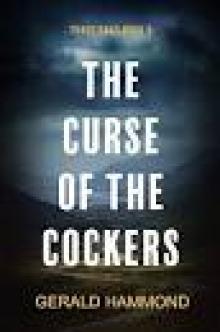 The Curse of the Cockers (Three Oaks Book 5)
The Curse of the Cockers (Three Oaks Book 5) Snatch Crop
Snatch Crop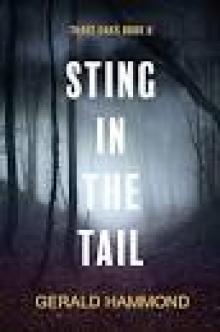 Sting in the Tail (Three Oaks Book 6)
Sting in the Tail (Three Oaks Book 6) A Dead Question (Honey Laird Book 2)
A Dead Question (Honey Laird Book 2) In Loving Memory (Honey Laird Book 3)
In Loving Memory (Honey Laird Book 3) Thin Air
Thin Air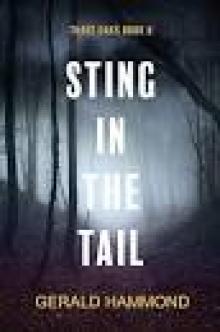 Sting in the Tail
Sting in the Tail Pursuit of Arms
Pursuit of Arms The Game
The Game Give a Dog a Name (Three Oaks Book 4)
Give a Dog a Name (Three Oaks Book 4) Fair Game
Fair Game The Executor (Keith Calder Book 10)
The Executor (Keith Calder Book 10) Whose Dog Are You? (Three Oaks Book 2)
Whose Dog Are You? (Three Oaks Book 2) Mad Dogs and Scotsmen (Three Oaks Book 7)
Mad Dogs and Scotsmen (Three Oaks Book 7) Cousin Once Removed
Cousin Once Removed The Worried Widow
The Worried Widow A Shocking Affair
A Shocking Affair Dead Weight (Three Oaks Book 11)
Dead Weight (Three Oaks Book 11) Whose Dog Are You
Whose Dog Are You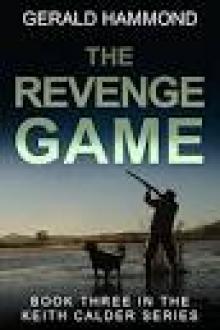 The Revenge Game
The Revenge Game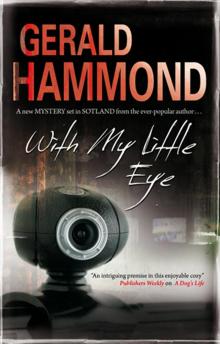 With My Little Eye
With My Little Eye Doghouse (Three Oaks Book 3)
Doghouse (Three Oaks Book 3) In Camera
In Camera Bloodlines (Three Oaks Book 8)
Bloodlines (Three Oaks Book 8)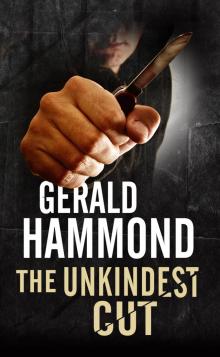 The Unkindest Cut
The Unkindest Cut